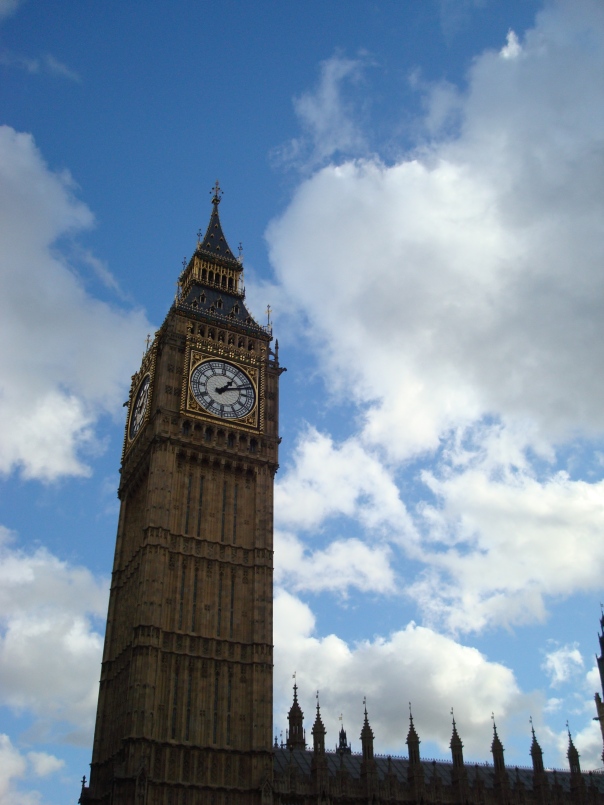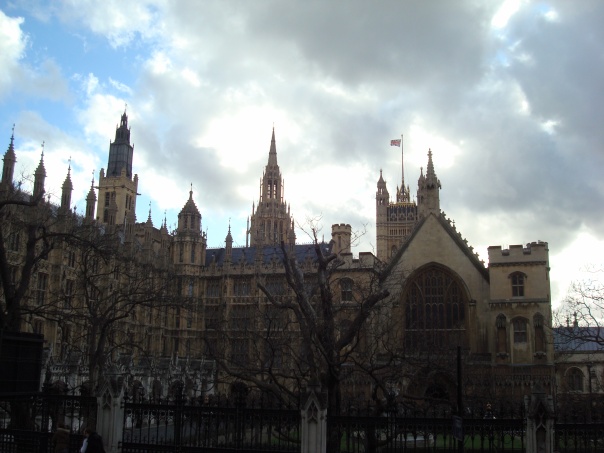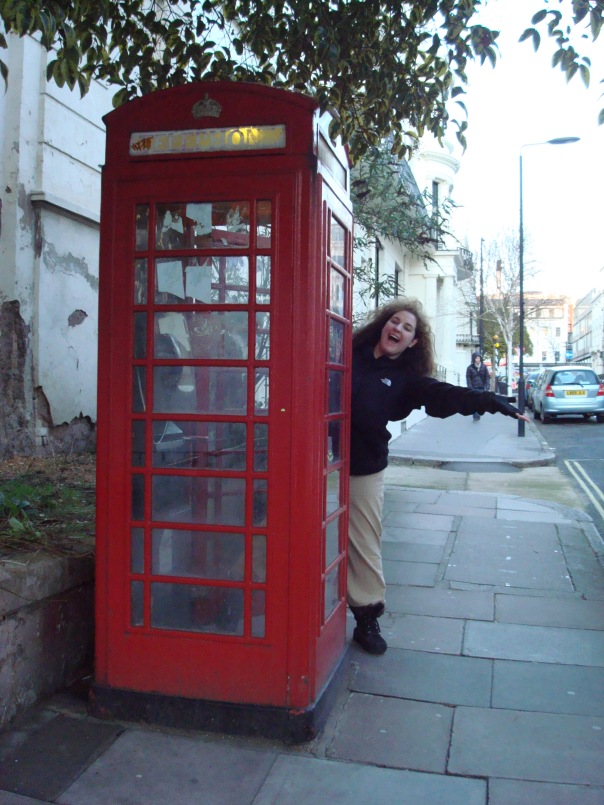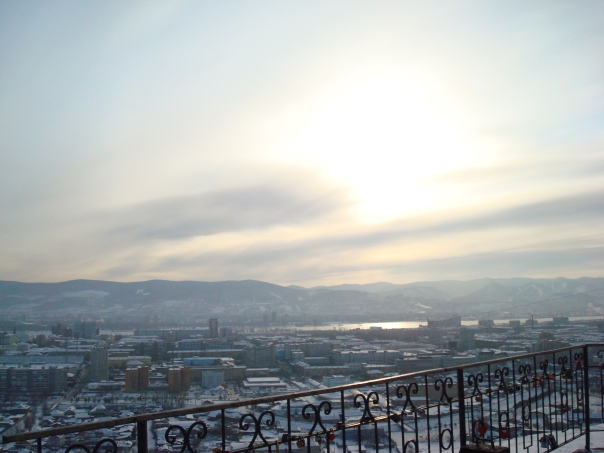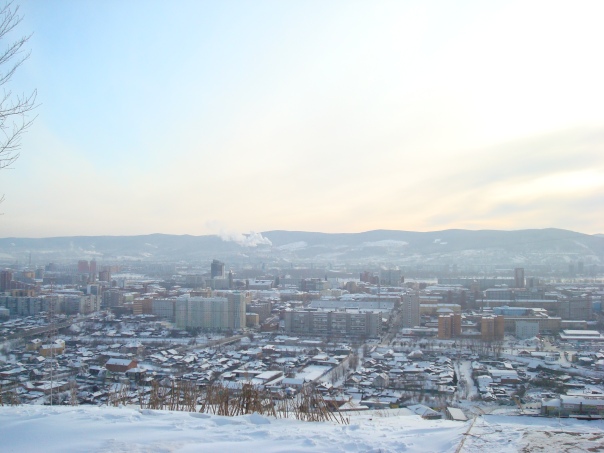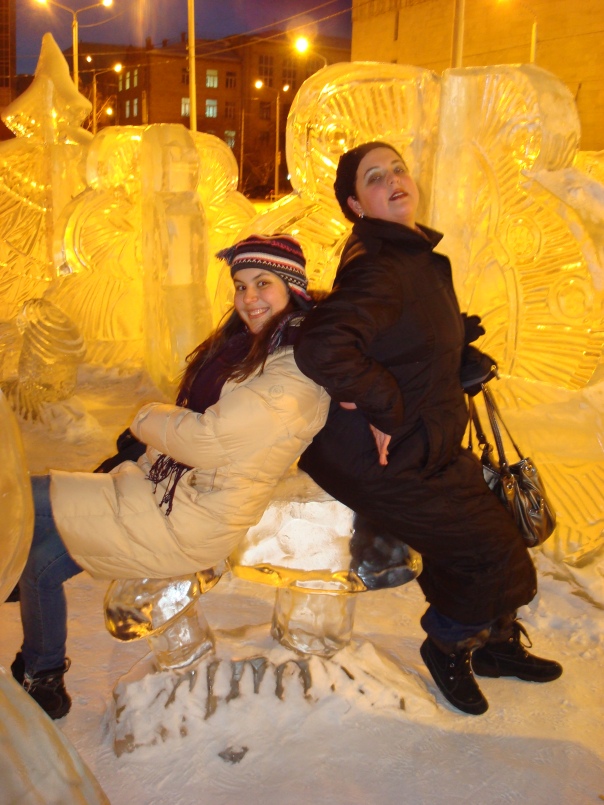My song! / Моя песня!
Well, after waiting a long time, the song has finally been completed. The link to the video (the description includes a download link if you should want it) is below. Many hours of work went into this. Enjoy!
http://www.youtube.com/watch?v=Mu8AnyUX3Cc
Take care and be well, moyi druz’ya!
Love,
Danya
Update! / Свежие новости!
Hello again!
I wanted to give you an update. The demo for my song has come out. The finished version should be available in a few weeks. I just wanted you to know that I haven’t forgotten!!!
If you wish, write to me and I can give you the link to the demo. I will post the final version when it comes out.
Take care and be well!
Love,
Danya
P.S. I have started another blog on international relations issues. If you’re interested in reading it, the link is here: http://chaoticir.wordpress.com/
The Farewell and the Return / Прощание и возвращение
Well, moyi druz’ya, I believe this will be my last post. Or, at least, my last full post. I haven’t forgotten about the song…it’s still being mixed and mastered.
I’ve been back in the U.S. for almost a month now. I didn’t write about this sooner intentionally, because now I can write a better description of what it is like to readjust.
I must confess that returning to the U.S. and readjusting to life here was far, far more difficult than adjusting to Russian life when I first arrived. My culture shock there was fairly minimal. (Still there, but not nearly as bad as I would have thought.) It’s the re-entry shock that is giving me trouble.
Leaving was so hard. I felt like my heart was going to break. My neighbor and friend Natalia graciously agreed to drive me to the airport at 4 AM (my flight departed at 6). My dear friend Katya met us there to see me off. I couldn’t hold back my tears, because I knew I was leaving my second home. Krasnoyarsk—indeed, Russia—had grown on me. Grown to be a part of me. But I knew I had people waiting for me back in the U.S.
Of course, it was wonderful to see my family again. It was a tearful reunion at the Miami International Airport baggage claim, where my mom and sister had come to help me get the luggage to the car. (Trust me, I had a lot of it! I had even sent things home in packages by Russian post before I left.)
I had a great party two days after I arrived, thanks to my wonderful sister Jen and her planning. So many of my friends came, even friends from out of town, so that they could see me. I was so happy to see them after such a long time. And I loved reuniting many of them in the same place, since most of them were fellow Novo-Collegians and friends with each other. (For you non-New College folks, that’s what we call ourselves…even the alums!)
But apart from that, there have been difficulties. My best friend Alex’s father passed away (the same Alex who passed away herself two and a half years ago) after a long battle with lung cancer. I didn’t expect that within a week of my return, I would be attending a funeral for someone I loved dearly, who was a part of a family I was so close to. But I am glad that his suffering is over.
I have returned to my part-time job with a representative in the Florida House of Representatives. I love my job there. But there is still the question of what is next. Will I get a call back from the full-time positions I’ve applied to? What will come of the graduate school applications I will be sending out? I have no idea.
Part of what makes this so incredibly difficult is the uncertainty.
I really do not know what comes next. But I guess it is the uncertainty that brings potential. There is so much potential in the uncertain. It’s good because there is a lot of choice. It’s bad because there is a lot of choice. What will be best?
I suppose I will just have to trust that I will make the right decisions in the end.
I KNOW I made the right decision in going to Russia. I was apprehensive about going away for so long, but in the end, it was probably the best thing I have ever done for myself. And I know I impacted others in a positive way and represented my country positively but fairly.
I miss my students. I miss my friends. I miss life there. It was always so interesting and there were so many things that I could do there that would not be possibly in the U.S. (Like recording in a legitimate recording studio! Unless you really know someone, it’s really expensive to do in the U.S.) Things there were so spontaneous, so fluid, unlike here in the States.
But it is not all bad being back in the U.S. It should never be forgotten that the U.S. has so many opportunities as well…these are simply opportunities of a different breed. Every country, every way of life, brings chances and opportunities that are unique. I have come to learn and appreciate that immensely.
I hope, dorogiye chitateli [dear readers], that I have been able to at least give you a glimpse of what I have experienced. I hope that you understand how important it is to travel so you can learn about the world. We are all on this planet together. If you live in a house with many rooms but you only stay in the same room all the time, you will never know what is in the other rooms. What views to the outside will you be missing? What treasures are hidden there? What people live in those rooms? You will never know until you dare to see it for yourself.
By doing so, you will open your heart to the world. As I realized that that was precisely what I was doing, I became aware that my heart was starting to encompass not just the world, but the entire universe that allows us to exist and live as we do.
I am all too aware that there are many negative, evil things that exist in this world. But if people learn to open their hearts…that will go such a long way to quieting the bad that seems to thrive nowadays.
I think this will give me more compassion in how I will approach my future. I want to go into international development in the context of conflict resolution. In other words, reconstruction of war-torn societies, helping people—survivors—get back on their feet and find a purpose to their lives. To make their world a safe place. The sad truth is that there are people who have never lived in a world that was safe for them.
But I digress. My point is that I have learned to take in other people, other cultures, other ways of life, into my heart and make it my own; for this, I urge you to do the same.
To my students and friends in Russia who might be reading this, I hope you know that you have changed me for the better by showing me your city, your country, your way of life, and, ultimately, accepting me into your world. Thank you for hearing me when I spoke of my own city, my country, my way of life, and watching as I tried my best to give you a glimpse of my world.
I know I have stated this before, but it needs repeating. Acceptance is what we need in this world, not simply tolerance. Tolerance alone will make no progress toward understanding. It is acceptance that is necessary.
Walk a mile in another’s shoes and you will see things you never realized were there. (My sister, of course, once quipped that it means that you’re a mile away and you have their shoes…hopefully, they’re a nice pair!)
Ya vsekh vas lyublyu i ya zhelayu udachi, zdorov’ya i schast’ya. [I love you all and I wish you luck, health, and happiness.] Thank you for reading this and following my journey to the degree that you could.
For my fellow world travelers…schastlivovo puti! [Happy trails!]
Love,
Danya
In the studio / На студии
As I write this, I am already back in the U.S. For the last month in Krasnoyarsk, I couldn’t get into my WordPress account to write new blog posts. Now I can, apparently, since I’m back.
The Saturday and Sunday before I left, the 16th and 17th of June, I was in a legitimate recording studio, working on my first-ever song! Although Max wanted to do the project, he had a difficult time finding inspiration and so he asked our friend Roma to help us. Roma agreed and wrote the melody and laid out the basic instrumentals. I wrote the lyrics and soon I found myself, headphones on, before a microphone in a professional recording studio where a friend of Roma’s works.
Let me say this…zapisaniye — ochen’ trudno! [Recording is very hard!] We had to do multiple takes of each verse and chorus. And it has to be done just right. Perfectionism is necessary when it comes to making music, I think. Thankfully, the sound engineer Zhenya’s girlfriend Yulia was there. She studied at the music academy in Krasnoyarsk (along with Max, Sandu, and a lot of my other Krasnoyarsk friends) and is a vocal teacher. She really made the process a lot easier.
It was such a remarkable experience. The microphone was incredible. When they first played back my voice after the very first take, I was shocked at how clearly I could hear myself. I had never really heard my own voice before, never so clearly.
After 8 hours over the course of two days, we finally came out with the full song. It’s not done yet, but I’ll make sure to post a link when it’s done. I am pleased with the results as they were at the time that I left the studio, but there’s still much editing to do — adding in instrumentals, sound effects, and whatnot.
I’m going to go back to sleep and recover from this jet lag…I have to adjust myself 12 hours back!
Vsevo dobrovo! [All the best!]
Love,
Danya
Reflection / Отражение
The semester is wrapping up. I’ve been busy grading papers and trying not to dwell too much on the fact that I go back in three weeks.
THREE WEEKS.
I can’t even fathom it. The time has gone so fast.
So now I’ve begun to do a little reflecting and I found something I wrote to my friends a couple of months ago. I can’t believe I’ve never shared it with you. But here it is:
I was guest lecturing at a private language school, as I was recommended by the university. I was teaching a group of 11 – 12 year olds at the elementary level. We were doing an activity where they were given drawings and they had to describe what was happening in the pictures to a partner. One boy was having a hard time, so I took a look. The picture was of people waiting at an airport, but the way it was drawn was kind of overwhelming even for me. So I told him to start with something he knew and continue from there. I pointed to the airplane and asked him to identify it. He did so correctly, and then I asked him what the people were doing. He then began to describe it (rather well, actually). At that point, I decided to teach them what to do if they are speaking English and want to say something they do not have the vocabulary for. I had them come up to the board and write a word that they knew in Russian but not in English. I then had them describe this word in English. One clever boy gave a word that had no English translation—kokoshnik, which is a type of hat. I explained that if they could use what vocabulary they know to describe what they don’t know, they could still communicate and be understood and they would probably be told the proper word to use. I would then tell them the English translation (if there was one) of the word they had chosen.
The person who learned the most from this, however, was me.
I went to a gathering at my friend Lena’s place and seeing as my friend Max was in Thailand at the time and my friend Katya was busy working, I was with no one who spoke English. I was okay with this, because normally I speak Russian, but it’s helpful to ask for the words I’m looking for when I don’t know. However, remembering the lesson today, I decided to take my own advice and use what I already know. And you know what? I’ve never spoken Russian better.
My friend Mike has said to me many times: “You have everything you need to be a complete person.” It wasn’t until recently that I realized what he meant. I have the tools and the parts, I just have to put them together and use them.
I think I have discovered myself. I feel a sense of understanding that I have never experienced before. And lately I noticed that people’s attitudes toward me are changing for the better. I am being more respected. What actually highlighted this change for me was that I think I have found a romantic partner who will treat me right. My friend Mallory told me after I broke up with Mac: “You must be confident in yourself and the right people will come to you.” I was tired to being mistreated by myself and others, so I finally decided to work on understanding and accepting who I am. I am certain now that I have reached that point. I feel I am where I need to be in terms of personal progression.
When I said Russia has done me a lot of good, I really meant it. It has done wonders for me. I think you will see it when I return to the States.
Going back over this has reminded me of the cycle of back and forth in terms of personal progress that I have made, but I think overall I have moved forward. And it feels fantastic.
When I get back, I’m going to have a coming back party with my friends, get a new haircut, work on getting a full-time job, and spend time with my family. I think these are the best possible things I can do for myself.
I am truly torn about coming home. On the one hand, I am going to miss everyone here in Russia. I have made a home here. Really, it’s the first time I’ve been able to make a life I can call completely my own. But on the other hand, I miss everyone at home, more than you can imagine.
I hope the changes in me become apparent to my loved ones. I know they have been waiting a long, long time to see me become more confident. I think this time they’re going to. I have my ups and downs in confidence from time to time, but it’s been getting better overall.
I must go, moyi druz’ya, but take care and be well.
Love,
Danya
My First Academic Conference / Моя первая академическая конференция
I was recently asked to speak at a conference being held by the Institut filologii i yazikovoy kommunikatsii [Institute of Philology and Language Communication], which is the institute of the university I teach in. The theme was on cross-cultural communication through text and dialogue. I had a heck of a time trying to think of a topic, but my friend Katya suggested that I talk about comparative academic discourse in Russia and the U.S. I decided to modify this a bit to how teachers and students communicate. But here was the most interesting part…I was asked to do it in both English and Russian.
Both???
I loved the idea of writing and giving a speech in Russian, but it disconcerted me that they asked me to do it in both languages. I had no idea how to approach it at first, but in the end I decided it would suffice if I simply did the introduction in Russian and the rest in English. I wrote the speech and submitted it, satisfied that it fulfilled the requirement.
But it was a different story when I actually got there.
It turned out I was one of the five keynote speakers. Which was fantastic! However, my heart sank as I realized everyone was giving their speeches all in Russian. Even the professor from Korea was giving his speech in heavily-accented Russian. Why did they ask me to do it partly in English, then? Not everyone there spoke English well, if indeed they spoke it at all, as many of them study other languages than English. I tried to reassure myself, reminding myself that this is what they had asked me to do.
Finally it was my turn to speak. I am not afraid to speak in front of large crowds. I was not nervous at all on that front. What made me nervous was that I would be looked down upon for not doing my speech entirely in Russian. I know that I have very good writing skills in Russian and I’m more than capable of writing a speech in it, but that didn’t mean the people present would know that.
So I began to speak in Russian. I could see the surprise on the faces of some of the people there…many of them were not aware that I spoke Russian so well. I explained that I would begin in Russian and continue in English. At the end of the introduction, I actually got applause. I suppose I should have been flattered.
You’re probably wondering what I said. I think you will find it interesting, so I have copied and pasted the English part of my speech below. If you have questions, by all means ask in the comments for this post. I’m always happy to answer.
I hope you enjoy, moyi druz’ya!
Until next time, be well.
Love,
Danya
COMPARATIVE DISCOURSE IN ACADEMIC SETTINGS
Comparison of the university systems
In order to understand the differences in discourse, you must first gain an understanding of the differences between the university systems in both nations. The setting of an academic environment ultimately determines the nature of discourse between professor and student.
In American universities, the students determine their own curriculum. They have the ability to choose from a variety of classes in their chosen field as well as experiment with courses outside of it. Very often there are specific required courses or required types of courses each student must take, such as mathematics, science, and history, but it depends on the university. Here in Russia, the students are put into groups based on their field of study and together they follow a pre-determined curriculum.
Exams are one way that students and professors communicate. In Russia, they are mostly spoken exams. In the U.S., they are almost always written, in part because the number of students in a university classroom in the U.S. is generally much larger than in Russia. In any case, exams are used in both countries to demonstrate to the professor that students are learning and understanding the material. The professor determines, based on given criteria, what score the student gets. This feedback signals to the student what level of knowledge they have reflected.
That brings up one more important difference: classes in Russian universities are generally much smaller than in American ones. This is one thing I love about the Russian university system. It means that the students can get more attention. My sister attends the University of Florida, which is about the same size as SFU in terms of the number of students. Her classes, however, are often so large that the university will show the lectures online! That is to say, there are often HUNDREDS of students in a single class, especially the introductory courses.
I should note that the physical setup of the classroom in both countries is very much the same, usually rows of desks before the instructor’s desk and a blackboard or whiteboard. This structure makes it very clear that the professor or instructor is the leader within the classroom: it is he or she who leads the events and the flow of learning that occur there. However, as I will explain later, the nature of this leadership position in both countries is very different.
There is also the concept of the “cтароста” prevalent in many Russian universities. There is no such thing in American universities because there is no group system. I find the староста to be interesting. It reflects that attendance in Russian universities is supposed to be stricter than in American ones. In the U.S., it is not so unusual for a student to not attend the course and to simply show up for exams and presentations; professors are usually not strict about attendance. Of course, I’ll add that it depends on the professor. Some professors fail students for not attending enough.
Communication between students and professors: Groups
Within the classroom in an American university, the dynamics of student-professor interaction is quite different from that in a Russian university. In the U.S., professors are far more inclined to use what is known as the Socratic method, meaning that classes are conducted on a discussion basis rather than a lecture basis. It requires more active participation on the part of the students. In general, the professor will pose questions related to the topic of the day, with extensive readings assigned beforehand which must be completed by the students before the next class. The students in turn must generate discussion based on these questions and the readings that they have been given. Here I will now refer to the nature of the leadership position that I mentioned before: the professor, in this case, acts as a facilitator of discussion. He or she ensures that the students stay on topic and also uses his or her knowledge to question the students’ assumptions.
Within the classroom of a Russian university, on the other hand, I have observed that it is far more likely to be lecture-based; notice, however, that I said “more likely” and not “always”. I shall note that the likelihood of using lecture methods in a Russian university largely depends on the course subject. At least here in this university I have seen that language courses, for example, are generally more interactive than, for example, a history class. In any case, the general role of the professor is to conduct lectures.
I have heard the difference in the way professors run their classrooms in the U.S. and Russia described respectively as informal and formal. I will openly disagree with this. In my experience, it depends on the professor. Every professor has a different teaching style that gets reflected in the individual classroom dynamics. As an example, some professors in the U.S. prefer to combine lecture and discussion, others solely use discussion and others use solely lecture. I have had professors who fell into all three categories. Categorizing the methodology of American and Russian university instructors solely as “formal” or “informal” is misleading.
In group settings, I have found that the discourse in terms of register and vocabulary in Russian universities is just as formal as in American universities. There are unspoken rules about civility and politeness when class discussions are being conducted which are generally followed in both countries. Respect for others’ ideas is highly encouraged and the way in which students communicate with the professor and with each other requires diplomacy and tact.
Communication between students and professors: Individual
The differences in discourse in Russian and American academic settings become much clearer when you look at discourse between an individual student and a professor.
In the U.S., the most acceptable ways of contacting a professor are by e-mail and by visiting during the professor’s office hours. Talking on the telephone, unless there is an emergency of some kind, is considered too informal and too personal. E-mails must be formally written and polite, including a greeting and a proper ending. When talking face to face, it is generally more relaxed. Despite this less formal feeling, the student, at least, must always continue to be polite. Professors are generally expected to be polite as well, but not as much as the student. For example, when I would speak with my Russian professor, he would use “ты”, not “Вы”, when addressing me. I imagine that if English had such a distinction with the pronoun “you”, it would be the same in general for all student-professor interactions. This reflects the idea that the professor is an expert and a leader and therefore deserves to be addressed with higher respect than the student.
In Russia, I see that it is appropriate for students to contact their professors by phone, e-mail, and during office hours. While there must also be a sense of politeness no matter what way they communicate, both students and professors use “Вы” to address one another. This shows mutual respect. I actually found this quite startling. That is to say, I always use “Вы” when I am addressing someone I don’t know or someone I want to be polite with—including my students when I speak to them in Russian—but I wasn’t aware that was the general practice. In my view, this puts professors and students on a more even level. To me, it seems that students and professors in Russia have less formal interpersonal relations with each other. Ironic, considering that Russians use the more formal, polite version of the word “you” in such settings!
The university I attended in the U.S., New College of Florida, had a unique way of professors to communicate with students. Instead of providing scores or marks, professors are required to write evaluations about the students’ work for the course. They are supposed to give polite but honest feedback to the student about what they did well and what they could have done better on. This is not a common thing in American universities; this is unique, because New College is a VERY small school (only 800 students in all), small enough that professors can spend time evaluating each student. Though it is an unusual system, I bring it up because it explains my own teaching style here at SFU. I not only give my students a mark on their work, but I always explain why they received the mark they did. I find this is an effective way to tell my students what they need to work on and it often gives me an opportunity for me to offer them personal praise for their successful efforts, which I know they appreciate.
Conclusion
In the end, you can see that the ways in which students and professors communicate with one another in both the U.S. and Russia have some importance differences, but they are not completely different. This is not to say one system or academic culture is better than the other. That would be like saying that American culture is better than Russian culture or that Russian culture is better than American culture, neither of which is true. In some ways the academic cultures are similar. As we have seen, expectations of behavior for students in both countries have much in common: they are expected to do their work, show politeness to their professors and each other, and participate where it is appropriate.
Students Without Borders / Студенчество без границ
March 17th was St. Patrick’s Day for all of you back in the U.S. For me, it was a rather interesting intercultural event–“Studenchestvo bez granits” or “Students Without Borders”. (I should note that “studenchestvo” is better translated as “studentship” but that’s not a word I ever really hear…so “students” it is.)
The university had asked me months beforehand to set up a table representing the U.S. Naturally I agreed. At the time there was another Fulbrighter, Linda, who was teaching computer science at the aerospace university here in Krasnoyarsk. She was also informed of the event and was assigned to help. It was fantastic that she did…she brought peanut butter, bread, and Coca-Cola as samples for the students.
The event took place at the Sibir convention center. I didn’t know how large it was going to be…it was larger than I expected, though. There were so many countries represented there…besides the U.S., there were tables for Azerbaijan, Kyrgyzstan, Armenia, Japan, China, South Korea, Spain, Germany, France, and even a general table for African countries (I found out that table was being run by people from Cameroon, they were really cool); they had a few Russian ethnic republics as well, such as Yakutia (the Sakha Republic) and Tyva.
We were there for several hours, answering questions, asking questions of others, handing out sample peanut butter sandwiches (which were a hit, by the way, as people came back for more), playing games, and listening to songs being sung on the nearby stage all the while.
The coolest part was that I got to meet so many people from different countries. I gave out my contact information to a lot of them (and many of them contacted me after the event by Vkontakte, the Russian version of Facebook, as well as Facebook itself). It was fantastic. I also got to learn about different cultures, even though it was just a glimpse…people helping to run the event were often wearing traditional clothing and many of the tables had prepared traditional foods to try. It was all beautiful. (Side note…to my female readers, if you get the chance to go to Yakutia at some point in your life, the jewelry they have is GORGEOUS! I asked if there was a place in Krasnoyarsk I could purchase any, but I was told I would have to actually go to Yakutia.)
Moyi druz’ya, this is why I chose to do this. I have the opportunity to share my country and culture with others as well as learn about other countries and cultures from people I would never get the chance to meet if I hadn’t left the U.S. This is why I encourage everyone to try to travel outside of their rodina [motherland, homeland] at least once in their life. It is the best gift you can give yourself. Why? Because you will not only understand others better, but also yourself. And you will be enriched for it.
Until next time, be well.
Love,
Danya
Wonderful Adventures, Part 4 of 4 / Замечательные приключения, Часть 4 из 4
Aaaaaand for the last wonderful adventure…my birthday! (February 5, for the record.)
On the night of the 4th, we went to Club Kleo, an expensive but nice karaoke place. I had a few friends with me: Katya, Max, Lera, Elya, and Anya. It was fantastic. The staff at the club, who know me, presented me with a bottle of champagne, which was very nice of them. At the end of the night (it was late) we went back to Katya’s place to crash for the night.
The next day we continued to hang out at Katya’s place until the evening, when we went to our usual Sunday night singing club at the English School Cafe. There it was fantastic. We sang a bunch of our usual songs along with Happy Birthday (heehee!) Katya and I also sang “Defying Gravity” from the Broadway musical Wicked.
At around this time we had a series of couch surfers from different countries staying with us: people from France, Spain, Germany, Denmark, South Korea, Austria, and so many more. It was amazing to meet so many people from all over the world. If you don’t know about CouchSurfers.org, you should check it out. It’s a great way to meet people!
That’s it for now. I hope all is well with you.
Take care, moyi druz’ya!
Love,
Danya
Wonderful Adventures, Part 3 of 4 / Замечательные приключения, Часть 3 из 4
LONDON CALLING!
Here I will write a bit about my non-Siberian adventure to London.
What an AMAZING city!
When I arrived at the airport, I met with my friend Kerry. We had been talking on the internet for years but we had never met in person. She lives quite a distance outside of London, but when I told her that I was coming to visit, she agreed to come to London so we could meet. She is such a charming girl, I really enjoyed her company. We spent the day exploring Westminster, where I was staying. I didn’t realize that Westminster is actually a separate city from London proper, but it is part of the London metropolitan area.
The weather was gloomy and grey, but the fact that there was no snow was startling to me. When I left, the temperature in Krasnoyarsk was -40! (Fahrenheit, Celsius, doesn’t matter at that point, that’s where the two measures converge!)
Kerry left that night and I explored the city a little on my own. The tube system (the metro) is not hard to figure out, the maps are really clear.
I was staying at a nice little hostel called Equity Point. If you need a relatively inexpensive place in London to stay, I do recommend it. (Just $19 a night…cheap for London!)
The next day, a fellow Russian Fulbrighter, Juliana, came to join me. She and I went on one of the double-decker bus tours, which was so cool! We absolutely loved it. And the tour guide was hilarious.
We ended up doing some shopping, going to the British Museum (all you language nerds out there rejoice…that’s where the original Rosetta Stone is!), seeing a dance recital, going to Chinatown…it was absolutely incredible. There were places we didn’t get the chance to see, unfortunately, such as the Buckingham Palace.
We definitely got fish ‘n chips, though, with a nice side of warm cider to go with it. Delicious!
I loved London. I loved the people, the atmosphere, and being in Europe for the first time. (Unless you count my trip to the Paris airport…) I really want to go back sometime.
I hope you enjoy the pictures below!
Take care, moyi druz’ya!
Love,
Danya
Wonderful Adventures, Part 2 of 4 / Замечательные приключения, Часть 2 из 4
PLEASE FORGIVE ME ONCE MORE. Bronchitis hit me full force shortly after I wrote the last entry and I haven’t been well enough to really write anything substantial. But now I’m going to try to catch up.
After I arrived back from Moscow, I had a day to hang out in Krasnoyarsk before going to London. I spent the day with Katya and a couch surfer from Krasnodar, Lera.
We had a really incredible day.
Katya and I wanted to show Lera around the city, so we first took her to the chapel on the hill where you can see the entire city. I’d never been there myself, so I was excited. It was an incredible view! Absolutely breathtaking. See below…
Yeah, that’s my city right there. My Russian home.
Then Katya took Lera around the city center for awhile. I stayed at the apartment, because I had to take care of a few things. But later I met up with them at Yurta, my favorite tea house. We had a really fantastic time, just talking and relaxing. This was followed up by a trip to see the ice sculptures in the city center. I’d heard about them, but I hadn’t really seen them.
They were (and still are at this moment) spectacular:
Later that evening, Lera taught me something amazing…how to make blini, Russian pancakes. They take a while, but they’re really easy to make and so delicious. And you can feed a few people with them. You can fill them with whatever you want: jam, smetana [sour cream], Nutella, ikra [caviar], condensed milk…it’s all so delicious. We had a few people over that night to join in the consumption of these delicious pancakes.
This was a really simple but wonderful day. I enjoyed it to the fullest.
For the record, Lera ended up going to Irkutsk after I left for London, but then after my return she came back to stay with us for a month. She’s a dear person and I was glad to have her around.
I will try to keep up more regularly with posts, but I was really very sick over the past couple of weeks. I’m okay now, but I was in the hospital at one point after I felt so sick I fainted (an experience I’d rather not repeat…let’s just say it takes 45 minutes for an ambulance to arrive here). I never knew that bronchitis could get so severe.
I must go for now. Take care, moyi druz’ya.
Love,
Danya
